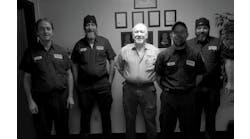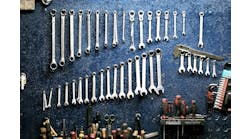As I write this, I’m a couple thousand miles away from my shops, on vacation with my wife. And my phone has been silent. No emergencies. No fires. No questions. No need for updates of any kind.
Yet, everything’s humming along nicely. In fact, we’re in the midst of a record month.
It’s a nice reminder: My shops don’t need me on a day-to-day basis. I have great people in place who operate based on our systems, processes and overall operational model. For me, at times, it feels like auto-pilot.
This is the goal, right? This is what we talk about so often and you’ve likely heard over and over. This is why we’re told, Work on your business, not in it.
That last phrase is usually the go-to in explaining how to get to a higher-level position in your shop that allows you the freedom and success you always dreamed about in owning a business. I’ve been thinking about that phrase a lot lately, because I see too many people pursue that and end up finding more strife than success. And the reason for those struggles is pretty simple:
They weren’t ready to step out of their businesses yet.
When I (or anyone else you’ve ever heard say it) tell you to work on your business rather than in it, it comes with some important context: You can’t do that until your business is at the right point for you to step out of a day-to-day role.
There’s no clear-cut rule on this, but a general guideline I tend to give is that people need to be past the $1 million threshold in annual revenue to consider this. It’s not a hard-and-fast benchmark, but let’s think about it a little bit. If you own a shop that is below that level, it’s likely that your “owner’s share” is still going to bills or debt. Now that you’re “on top” of the business, you’re not paying yourself the regular salary like you did as a lead tech or a service advisor; that goes to an additional person you added. If you don’t have enough volume (and the right mix of revenue and gross and net profit), you wind up taking steps backward.
We don’t hear this story too much, though, because we like to trust what we see—and we only see what people want to show us. We see our buddy who owns a shop driving a brand-new pickup, or buying a boat. Now that he’s “on top” of his business and not grinding it out, he has all this money at his disposal. We don’t see that he should’ve never bought that and that in doing so, he’s essentially broke.
Yet, we compare ourselves to him. We get caught in this trap of judging our business and making our decisions off comparisons to other people. And that’s when we make mistakes.
So, how do the people who have moved “on top” of their businesses and done it successfully get to that point? By being original.
I usually don’t like to do this, but I’ll use my own shops as an example: We are successful because we chose not to get caught in comparisons. We don’t try to replicate what other successful shops have done (even, though, yes, there certainly are plenty of things we can (and should) learn from each other). Instead, we worked to find what makes us unique and original. We wanted to differentiate yourselves. In doing so, we found our niche: We created an operational model that could scale the concept of working solely on European vehicles. Then we did the same with luxury American and Asian vehicles. We built everything around that and focused on what would work best for that niche. And because no one else was doing that, we built it out and created a monopoly on our market. We had a lean business model that focused on the right customer that would allow us to grow.
And while we created a unique approach to operations, our process for building our business isn’t unique—you can and should do the same. What makes your operation unique? What makes you stand out? How can you do things differently to differentiate yourselves? Be original. Don’t get caught in comparisons. Find your operational model and push it to grow. Build the business you want, so that you can live the life you want. Focus on that, and you will be able to step out of the day to day; you’ll be able to work on your business rather than in it.




